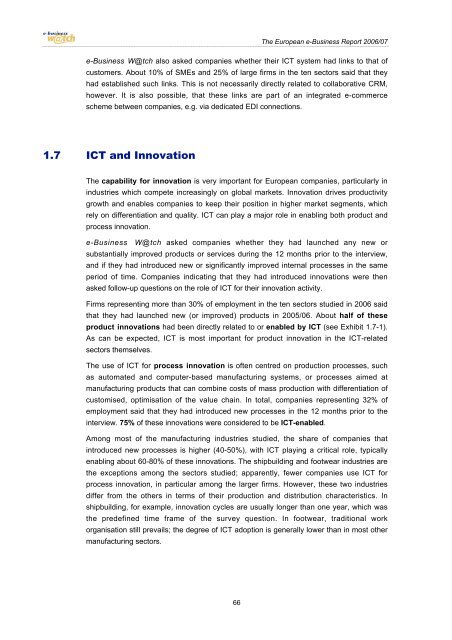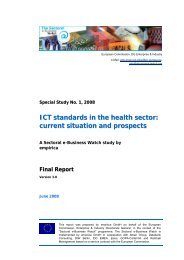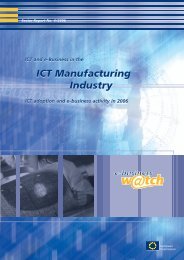- Page 1 and 2:
The European e-Business Report - 20
- Page 3 and 4:
The European e-Business Market W@tc
- Page 5 and 6:
The European e-Business Market W@tc
- Page 7 and 8:
The European e-Business Market W@tc
- Page 9 and 10:
The European e-Business Market W@tc
- Page 11 and 12:
The European e-Business Market W@tc
- Page 13 and 14:
The European e-Business Market W@tc
- Page 15 and 16: The European e-Business Market W@tc
- Page 17 and 18: The European e-Business Market W@tc
- Page 19 and 20: Section I: The e-Business Index 200
- Page 21 and 22: Section II: A Comparison of e-Busin
- Page 23 and 24: The European e-Business Market W@tc
- Page 25 and 26: The European e-Business Market W@tc
- Page 27 and 28: The European e-Business Market W@tc
- Page 29 and 30: The European e-Business Market W@tc
- Page 31 and 32: The European e-Business Market W@tc
- Page 33 and 34: The European e-Business Market W@tc
- Page 35 and 36: The European e-Business Market W@tc
- Page 37 and 38: The European e-Business Market W@tc
- Page 39 and 40: The European e-Business Report 2006
- Page 41 and 42: The European e-Business Report 2006
- Page 43 and 44: The European e-Business Report 2006
- Page 45 and 46: The European e-Business Report 2006
- Page 47 and 48: The European e-Business Report 2006
- Page 49 and 50: The European e-Business Report 2006
- Page 51 and 52: The European e-Business Report 2006
- Page 53 and 54: The European e-Business Report 2006
- Page 55 and 56: The European e-Business Report 2006
- Page 57 and 58: The European e-Business Report 2006
- Page 59 and 60: The European e-Business Report 2006
- Page 61 and 62: The European e-Business Report 2006
- Page 63 and 64: The European e-Business Report 2006
- Page 65: The European e-Business Report 2006
- Page 69 and 70: The European e-Business Report 2006
- Page 71 and 72: The European e-Business Report 2006
- Page 73 and 74: The European e-Business Report 2006
- Page 75 and 76: The European e-Business Report 2006
- Page 77 and 78: The European e-Business Report 2006
- Page 79 and 80: The European e-Business Report 2006
- Page 81 and 82: The European e-Business Report 2006
- Page 83 and 84: The European e-Business Report 2006
- Page 85 and 86: The European e-Business Report 2006
- Page 87 and 88: The European e-Business Report 2006
- Page 89 and 90: The European e-Business Report 2006
- Page 91 and 92: The European e-Business Report 2006
- Page 93 and 94: The European e-Business Report 2006
- Page 95 and 96: The European e-Business Report 2006
- Page 97 and 98: The European e-Business Report 2006
- Page 99 and 100: 98The European e-Business Report 20
- Page 101 and 102: The European e-Business Report 2006
- Page 103 and 104: The European e-Business Report 2006
- Page 105 and 106: The European e-Business Report 2006
- Page 107 and 108: The European e-Business Report 2006
- Page 109 and 110: The European e-Business Report 2006
- Page 111 and 112: The European e-Business Report 2006
- Page 113 and 114: The European e-Business Report 2006
- Page 115 and 116: The European e-Business Report 2006
- Page 117 and 118:
The European e-Business Report 2006
- Page 119 and 120:
The European e-Business Report 2006
- Page 121 and 122:
The European e-Business Report 2006
- Page 123 and 124:
The European e-Business Report 2006
- Page 125 and 126:
The European e-Business Report 2006
- Page 127 and 128:
The European e-Business Report 2006
- Page 129 and 130:
The European e-Business Report 2006
- Page 131 and 132:
The European e-Business Report 2006
- Page 133 and 134:
The European e-Business Report 2006
- Page 135 and 136:
The European e-Business Report 2006
- Page 137 and 138:
The European e-Business Report 2006
- Page 139 and 140:
The European e-Business Report 2006
- Page 141 and 142:
The European e-Business Report 2006
- Page 143 and 144:
The European e-Business Report 2006
- Page 145 and 146:
The European e-Business Report 2006
- Page 147 and 148:
The European e-Business Report 2006
- Page 149 and 150:
The European e-Business Report 2006
- Page 151 and 152:
The European e-Business Report 2006
- Page 153 and 154:
The European e-Business Report 2006
- Page 155 and 156:
The European e-Business Report 2006
- Page 157 and 158:
The European e-Business Report 2006
- Page 159 and 160:
The European e-Business Report 2006
- Page 161 and 162:
The European e-Business Report 2006
- Page 163 and 164:
The European e-Business Report 2006
- Page 165 and 166:
The European e-Business Report 2006
- Page 167 and 168:
The European e-Business Report 2006
- Page 169 and 170:
The European e-Business Report 2006
- Page 171 and 172:
The European e-Business Report 2006
- Page 173 and 174:
The European e-Business Report 2006
- Page 175 and 176:
The European e-Business Report 2006
- Page 177 and 178:
The European e-Business Report 2006
- Page 179 and 180:
The European e-Business Report 2006
- Page 181 and 182:
The European e-Business Report 2006
- Page 183 and 184:
The European e-Business Report 2006
- Page 185 and 186:
The European e-Business Report 2006
- Page 187 and 188:
The European e-Business Report 2006
- Page 189 and 190:
The European e-Business Report 2006
- Page 191 and 192:
The European e-Business Report 2006
- Page 193 and 194:
The European e-Business Report 2006
- Page 195 and 196:
The European e-Business Report 2006
- Page 197 and 198:
The European e-Business Report 2006
- Page 199 and 200:
The European e-Business Report 2006
- Page 201 and 202:
The European e-Business Report 2006
- Page 203 and 204:
The European e-Business Report 2006
- Page 205 and 206:
The European e-Business Report 2006
- Page 207 and 208:
The European e-Business Report 2006
- Page 209 and 210:
The European e-Business Report 2006
- Page 211 and 212:
The European e-Business Report 2006
- Page 213 and 214:
The European e-Business Report 2006
- Page 215 and 216:
The European e-Business Report 2006
- Page 217 and 218:
The European e-Business Report 2006
- Page 219 and 220:
The European e-Business Report 2006
- Page 221 and 222:
The European e-Business Report 2006
- Page 223 and 224:
The European e-Business Report 2006
- Page 225 and 226:
The European e-Business Report 2006
- Page 227 and 228:
The European e-Business Report 2006
- Page 229 and 230:
The European e-Business Report 2006
- Page 231 and 232:
The European e-Business Report 2006
- Page 233 and 234:
The European e-Business Report 2006
- Page 235 and 236:
The European e-Business Report 2006
- Page 237 and 238:
The European e-Business Report 2006
- Page 239:
The European e-Business Report 2006
- Page 242 and 243:
The European e-Business Report 2006
- Page 244 and 245:
The European e-Business Report 2006
- Page 246 and 247:
The European e-Business Report 2006
- Page 248 and 249:
The European e-Business Report 2006
- Page 250 and 251:
The European e-Business Report 2006
- Page 252 and 253:
The European e-Business Report 2006
- Page 254 and 255:
The European e-Business Report 2006
- Page 256 and 257:
The European e-Business Report 2006
- Page 258 and 259:
The European e-Business Report 2006
- Page 260 and 261:
The European e-Business Report 2006
- Page 262 and 263:
The European e-Business Report 2006
















